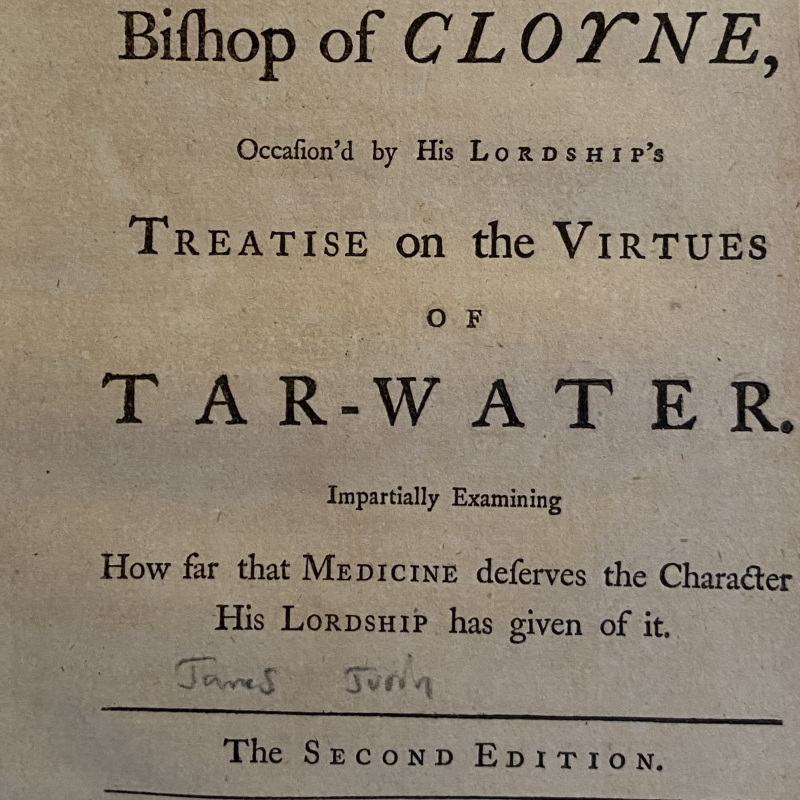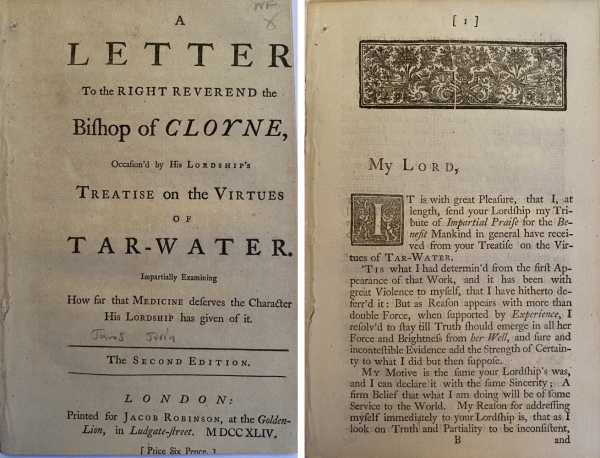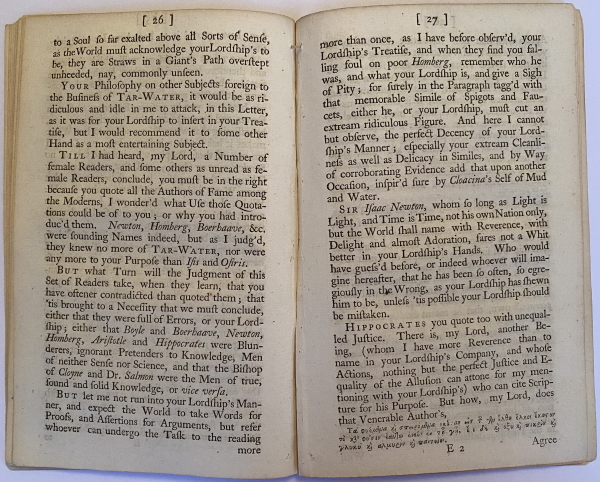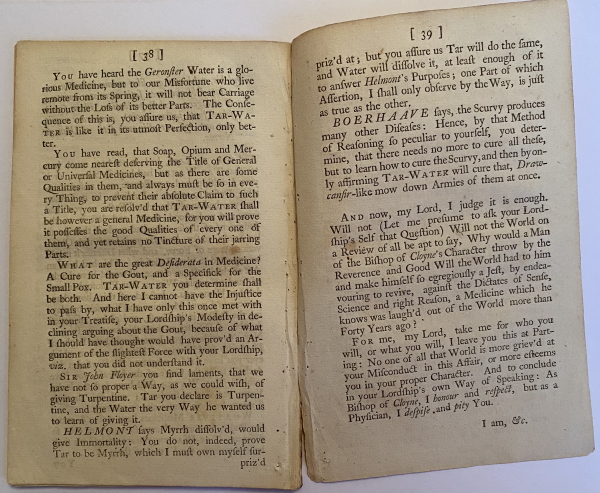How did a leading physician and Fellow of the Royal Society respond to a book, written in 1744 by the Bishop of Cloyne, on the restorative powers of tar-water? None too politely, as Rupert Baker discovers...

Collection development is tricky in a pandemic. We only have irregular access to our climate-controlled strongrooms in Royal Society HQ at the moment, so although I’ve been browsing the catalogues of antiquarian book dealers, the thought of acquiring anything sizeable or expensive to share (limited) house space with our drying laundry, cooking aromas and two locked-down teenagers is a bit of a non-starter.
I did make a minor purchase recently, however. A small and inexpensive pamphlet was brought to my attention, and is now tucked safely, in several protective layers, into one of the few remaining gaps in my upstairs bookshelves pending transfer to the Library. It dates from 1744, and is the second edition of a work by James Jurin FRS, rejoicing in a title which merits a paragraph all to itself:
‘A letter to the Right Reverend the Bishop of Cloyne, occasion'd by his Lordship's treatise on the virtues of tar-water. Impartially examining how far that medicine deserves the character his Lordship has given of it’ (London: printed for Jacob Robinson, at the Golden-Lion, in Ludgate-street).

Title page and introduction to Jurin's 1744 pamphlet
Now, although I’m rather partial to a German band of similar name, I’d only vaguely heard of tar-water as a medicinal preparation. On investigation, it turns out to be water stirred together with pine tar and then drawn off. Popular in medieval times, it was also a fictional favourite of Mrs Joe Gargery, Pip’s sister and carer in Great Expectations, who ‘always kept a supply of it in the cupboard; having a belief in its virtues correspondent to its nastiness.’ This belief was shared by George Berkeley, the aforementioned Bishop of Cloyne, whose popular book Siris (1744) extolled the virtues of tar-water, suggesting that the properties of tar as an external disinfectant could also have dramatic restorative effects when taken internally. Well, that sounds familiar…
As you’ll have spotted from the shared year of publication, Siris drew an immediate response from Jurin, an eminent London physician who served as Royal Society Secretary from 1721 to 1727, the final years of Isaac Newton’s Presidency, and whose work in documenting smallpox inoculation is highlighted in this earlier blogpost. It’s a response dripping with sarcasm from the outset, as Jurin comments on the Bishop’s claims regarding the universal healing powers of tar-water:
‘If it be true, that he who has discover’d a Remedy for any one of the Diseases our frail Bodies are subject to, has deserv’d more of the World than all the Heroes that our Poets and Historians have immortaliz’d; what must be your Lordship’s Praise who have taken this true Road to Glory, and soaring above vulgar Flight, have not stoop’d to deliver down a Remedy for One, but generously given at once a Cure for All.’
Jurin, while feigning outrage at the frequent vulgar attacks on the Bishop in natural philosophical circles (‘I profess, I never hear a Horse-Laugh in the Corner of a Coffee-house, but I guess your Lordship is the Subject of it’), then proceeds to demolish Berkeley’s claims one by one. He refers to the work of the great Dutch medical educator Herman Boerhaave FRS, and his wide range of treatments for various conditions, before concluding, tongue firmly in cheek once again:
‘Poor Boerhaave! had he known the Virtues of TAR-WATER, what a World of Pains might he have spar’d in this, as well as many other Cases, where he imagin’d different Remedies necessary…’
Citing ‘the visible Encrease in the Bills of Mortality, since it came into Use’ together with other objections, including the contradictory claims for tar-water as both a warming and a cooling remedy, and the general gullibility of people when presented with new ‘Miracles in Physick’, Jurin slams the Bishop with a line that could also be applied to modern-day conspiracy theorists:
‘You are determin’d that TAR-WATER shall be an universal Remedy, you have set your Heart and Reputation on the Proof of it, and therefore you resolve it shall be prov’d’.

Jurin took particular umbrage at the dismissal of his mentor Isaac Newton (‘whom so long as Light is Light, and Time is Time […] the World shall name with Reverence, with Delight and almost Adoration’) in Berkeley’s book. Modern hindsight does allow me to make one small correction to Jurin, who counters the Bishop’s recommendation of Siris ‘to studious Men’ by saying that such readers:
‘must despise your Treatise […] This perfect Absence of all Thought in your Lordship, indeed surprises me. To studious Men! I should as soon have thought to have recommended the Study of Cornelius Agrippa’s Occult Philosophy to a Newton…’
- well, the Royal Society Library possesses a 1533 copy of Agrippa’s De occulta philosophia, owned by none other than Newton himself! The great man was obviously using a different section of his library as a backdrop when on the eighteenth-century equivalent of a Zoom call with Jurin.
This minor excess of faith in Newton’s reading habits notwithstanding, Jurin’s refutation of tar-water is a bracing appeal to scientific reason and authority against quackery, fully deserving its place in the Royal Society’s collections. I won’t be going out of my way to acquire a counterbalancing copy of Siris for our Medicine collection; George Berkeley, despite his significant contributions to philosophy, never made it to the Fellowship of the Royal Society, and if Jurin’s readers somehow missed the disdain in the earlier sections of his pamphlet, he makes it icily clear in his final sentence:
‘And to conclude in your Lordship’s own Way of Speaking: As Bishop of Cloyne, I honour and respect, but as a Physician, I despise and pity You.’

(all photos by Charlie Baker)







